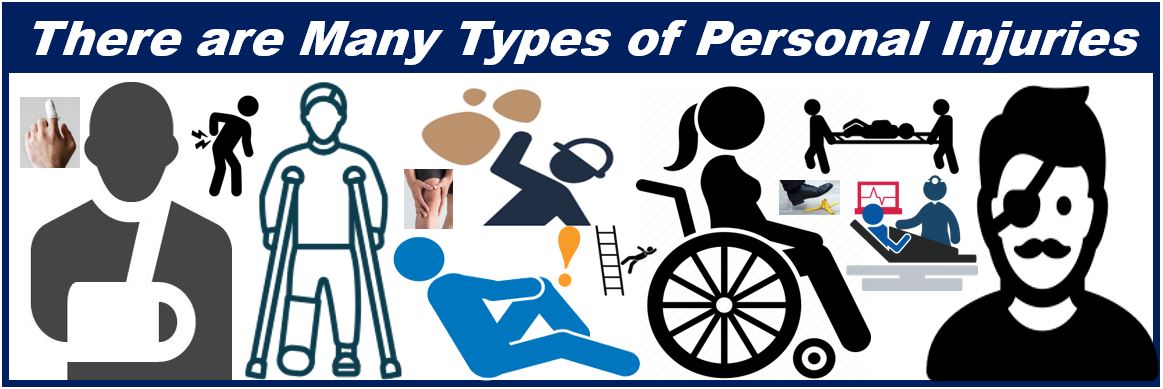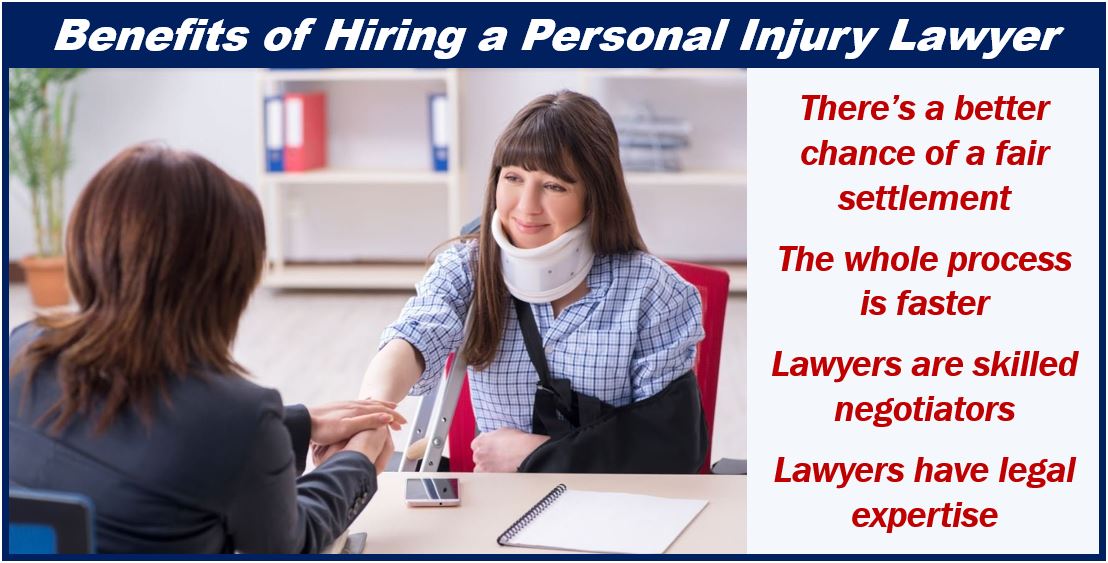What is a personal injury? Definition and examples
A Personal Injury is a physical injury that your body suffers rather than damage to something you own or your reputation. It is a legal term for an injury to a part of your body. It also includes injury to a person’s mind or emotions.
A broken leg is a personal injury as is a fear of going outdoors after a traumatic event.

Often, the physical, mental, or emotional harm is caused by another party. A personal injury does not necessarily have to be inflicted deliberately. However, to pursue a lawsuit, it is typically somebody else’s or another organization’s fault. For example, you may have become injured at work because your employer did not fully adhere to safety standards. Even if they complied with all rules and regulations, it may still be their fault. Most personal injuries are the result of accidents, which lawyers try to prove is somebody’s fault.
Cornell Law School has the following definition of the term:
“An injury not to property, but to the body, mind, or emotions. For example, if you slip and fall on a banana peel in the grocery store, personal injury covers any actual physical harm (broken leg and bruises) you suffered in the fall as well as the humiliation of falling in public, but not the harm of shattering your watch.”
Personal Injury Law or Tort Law
We refer to personal injury law as tort law. The word tort emerged in the English language in the mid-thirteenth century with the meaning “injury, wrong.” It came from the Old French word tort, which meant “crime, injustice, wrong.” The Old French word came from the Medieval Latin word tortum, meaning “injustice.”
A wide variety of types of personal injury claims come under the umbrella term tort law.
Types of personal injury claims
Personal injury claims may be the result of:
- Occupational accidents. An injury that a worker sustains in the workplace is known as an occupational injury.
- Product defect accidents.
- Road traffic accidents.
- Tripping or slipping.
- Assault claims.
- Medical malpractice.
- Dog (animal) bites.
- Defamation – libel and slander.
- False arrest or imprisonment.
The majority of claims in North America, Europe, Japan, Australia, and many other parts of the world involve injury from road traffic accidents.
Should you hire a lawyer?

Filing a personal injury claim is definitely something you should do with a specialized professional if you want to win your case and get the best settlement possible. This is especially the case if the injury is a serious one.
In one of our previous articles, I wrote:
“Filing a personal injury claim demands legal expertise. You can’t possibly handle everything on your own. And this is particularly true if you’ve been seriously injured.”
“Working with a professional will ensure that you get a fair settlement within the shortest time possible.”
A specialized legal professional will fight your case without being affected by irrelevant and possibly detrimental factors. Personal injuries can trigger emotional reactions; being in pain or feeling resentful can affect your ability to pursue a case objectively.
If you are worried about costs, ask your lawyer if they work on a no-win-no-fee basis. Many law practices do.
Protecting your business from lawsuits
Any business or organization can become the target of a personal injury lawsuit. Even if it does not have a workforce. If you own a small store that you manage alone, you may get sued if somebody slips on your premises and suffers an injury.
To prevent or reduce your vulnerability to lawsuits, consider following these tips:
- Take measures to reduce the risk of accidents to a minimum.
- Review your business’ safety measures periodically.
- If you purchase new equipment, make sure those who use it get the proper training.
- Have a strict limit on the number of hours your drivers can work continuously.
- Take out an insurance policy such as Workers’ Compensation Insurance or Liability Insurance.
In one of our previous articles, Veronica Cruz wrote:
“Precautions are, of course, the first line of defense against personal injury lawsuits, but if you have already been sued, lawyer up immediately.”
“Do not call the individual who filed the lawsuit, and don’t try to negotiate with their lawyer on your own because that’s what your personal injury defense lawyer is supposed to do for you.”
Additionally, maintaining detailed records of all safety protocols and incident reports can prove invaluable in the event of a legal dispute.
Personal injury terms
There are many compound phrases related to personal injuries. A compound phrase is a term that consists of two or more words. Below, you can see six commonly used compound phrases, their meanings, and how we use them in a sentence:
-
Personal Injury Case
A legal dispute that arises when one person suffers harm from an accident or injury, and someone else might be legally responsible for that harm.
Example: “After the car accident, she decided to file a personal injury case to seek compensation for her injuries.”
-
Personal Injury Lawyer
An attorney who provides legal representation to those who claim to have been injured, physically or psychologically, as a result of the negligence of another person, company, government agency, or any entity.
Example: “John consulted a personal injury lawyer to understand his rights after the workplace incident.”
-
Personal Injury Settlement
An agreement to resolve a personal injury case without going to trial, often involving payment to the injured person.
Example: “The personal injury settlement covered her medical bills and the income she lost while recovering.”
-
Personal Injury Protection
A type of car insurance coverage that pays for medical expenses, and sometimes lost wages and other damages, regardless of who is at fault for the accident.
Example: “Fortunately, her personal injury protection plan took care of the hospital expenses after the accident.”
-
Personal Injury Claim
A legal claim filed to seek compensation for injuries sustained by an individual in an accident due to someone else’s negligence or intentional act.
Example: “He filed a personal injury claim after slipping on the unmarked wet floor at the supermarket.”
-
Personal Injury Insurance
Insurance that covers medical expenses and a portion of lost wages for an individual who gets injured as a result of an accident.
Example: “Her personal injury insurance ensured that she was not overwhelmed by the financial impact of her accident.”
Two Educational Videos
These two interesting videos come from our sister channel on YouTube – Marketing Business Network. One is about “Personal Injuries” and the other about “Occupational Injuries.” They use easy-to-understand language and examples.
-
What is a Personal Injury?
-
What is an Occupational Injury?

